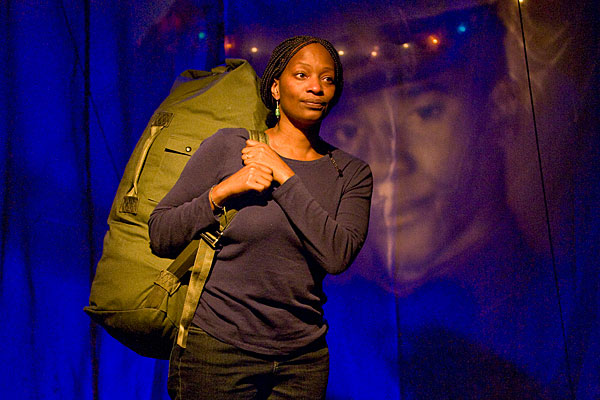
Think of war and posttraumatic stress disorder, and the mind veers toward explosions: noisy, irrevocable violence both physical and emotional. But that’s not the case in the subtle, wonderfully acted Welcome Home, Jenny Sutter, Julie Marie Myatt’s moving drama of a returning Marine whose crippling pain is mostly hidden behind a deceptively impassive and taciturn demeanor. Directed by Jessica Thebus, Sutter is a war story that doesn’t blare with blood and bombs but rather quietly moves in its portrait of Jenny Sutter’s slow, partial and almost imperceptible recovery from PTSD.
We first meet Jenny (Lily Mojekwu) as a disembodied voice, recalling an early, poignant memory: “Give me something to believe in,” the infant Jenny pleaded as she lay in her crib, looking for God to emerge from the cracks in the ceiling. The ceiling remained silent. As an adult returning home from tours in Afghanistan and Iraq, Jenny Sutter seems to have replaced prayers with a deep and abiding anger. She still has nothing to believe in, yet instead of pleas, she’s filled with rage and an overwhelming sense of loss. All this is made exquisitely clear when the lights come up on Mojekwu. If a picture is worth a thousand words, the shades of anguish and anger silently flickering in her eyes are worth ten thousand.
In a grimy bus station just a few hours from her home, Jenny is unable to face the prospect of returning to her family—which includes two children being cared for by her mother. Instead, she heads for Slab City, that off-the-grid community on a former military base in the California desert that’s part hippie commune and part Hooverville (and named for the cement slabs residents pitch their tents on.) Jenny’s destination is a whim, acted on after she reluctantly befriends the freewheeling Louise (Jennifer Avery), a young woman dubiously recovering from countless addictions (sex, alcohol, gambling, smoking, raisins) who is as talkative as Jenny is silent. Superficially, the unlikely pair have nothing in common. Within, both harbor hurting souls—Lou’s coming out in her cheery chatter, Jenny’s smoldering to the surface in grim sullenness.
Jenny’s slow reconciliation with the trauma she suffered at war takes place amid the colorful denizens of Slab City, expertly realized by Thebus’ small ensemble cast. As for Jackie and Rick Penrod’s set, it morphs from a bus station so filthy you can almost smell it to the eccentric world of the Slab, both locales impressively created on Next’s tiny, shallow stage.
Despite the ultimate resolution and tentative healing of its title character, Welcome Home, Jenny Sutter is never pat. Neither is it emotionally manipulative or sentimental. It’s an honest stare at the complexity of PTSD and its gradual erosion by the power of goodness within even the most damaged of people.
Welcome Home, Jenny Sutter continues through Dec. 23 at Next Theatre, 925 Noyes St., Evanston. For ticket information, go to nexttheatre.org.
Catey Sullivan is Chicago magazine’s contributing theater critic.
Photograph: Michael Brosilow


